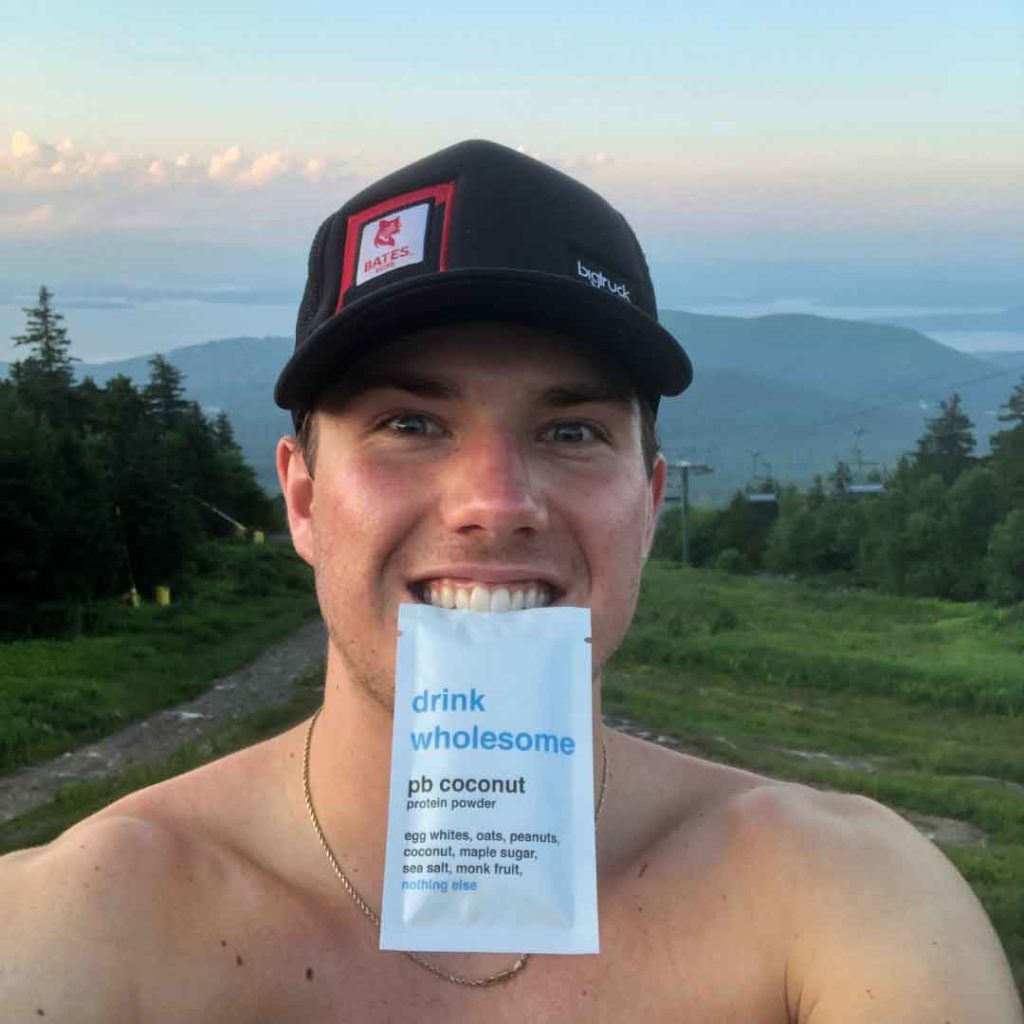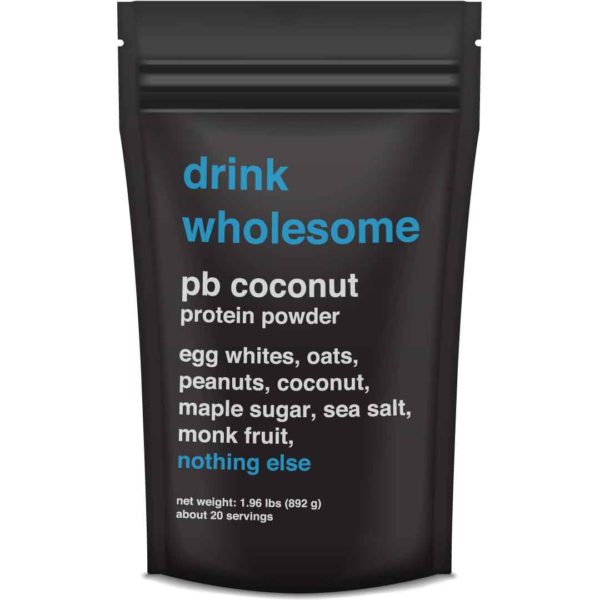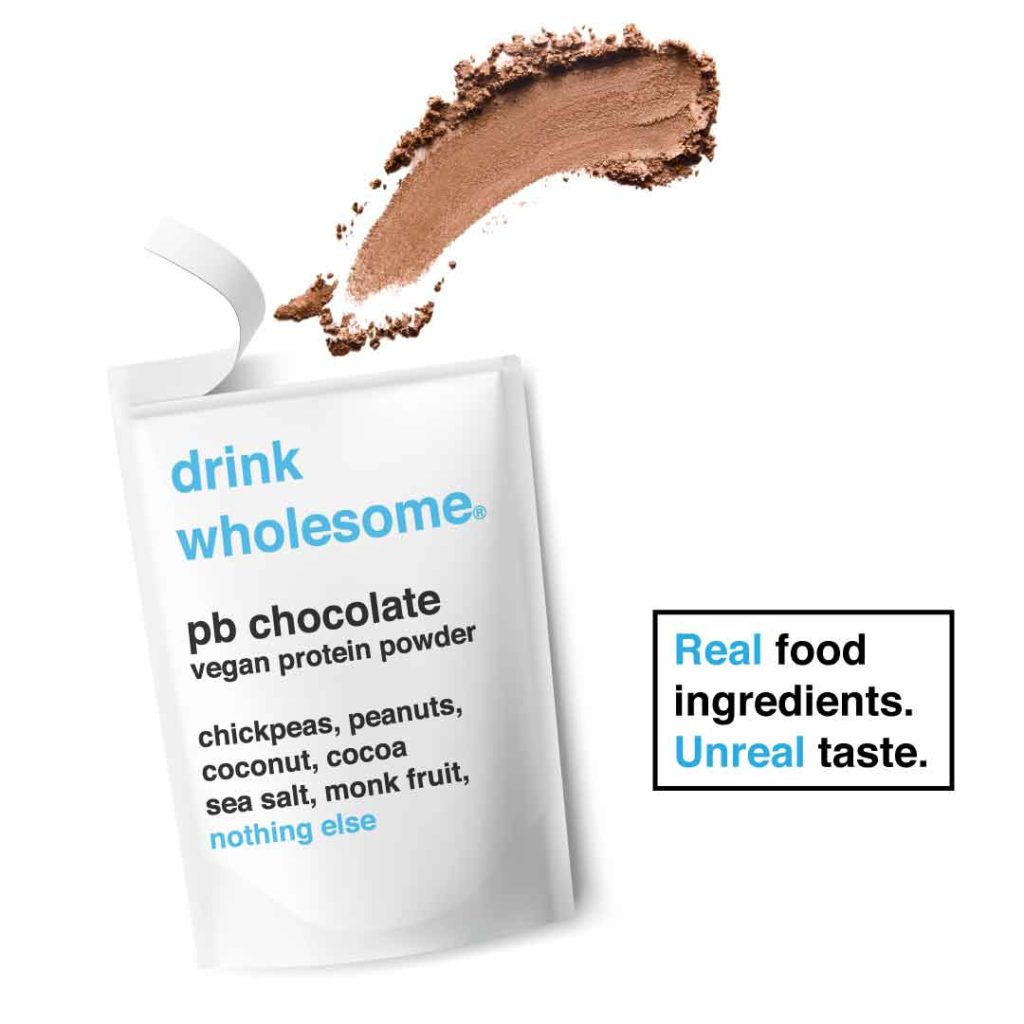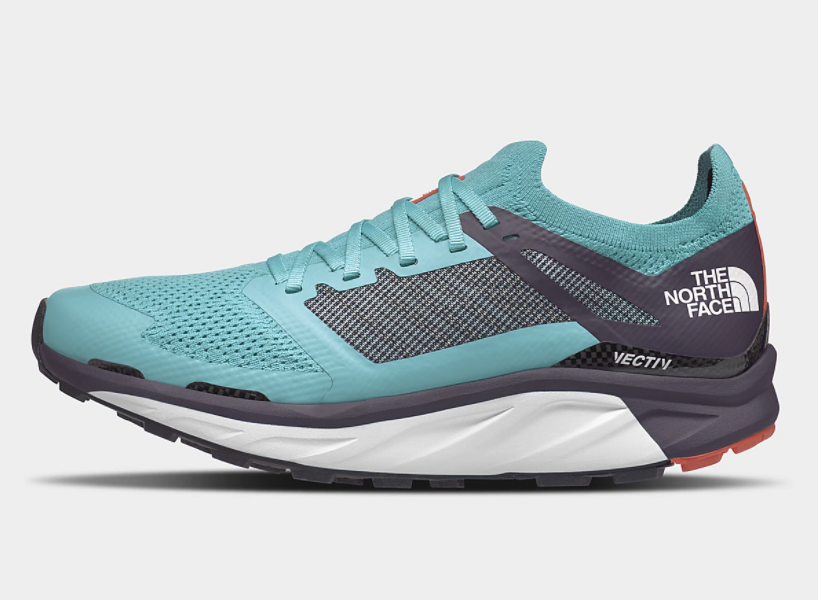
As summer training hours trend toward a peak, many athletes are looking for ways to support their nutritional needs, matching high volume training with high volume eating. A new product that should be on your radar is Drink Wholesome protein powder, created by former Williams ski racer Jack Schrupp. This protein is basically the RXBAR of protein powders: all natural without artificial flavorings or sweeteners, packing a high nutrient protein dense punch in each scoop.
The nature of exercise, in particular the type of training that supports building strength and fitness for cross country skiing, is a cycle of breaking down muscle then allowing the muscle to repair itself and grow stronger. Brick by brick, we build a stronger body and more efficient aerobic and cardiovascular systems to power us down the trail. Regardless of whether you follow a rigorous training schedule, upholding an overall active lifestyle with regular exercise increases the body’s energy demands, particularly carbohydrates to replenish glycogen stores and protein to support muscle recovery.
According to the International Society of Sports Nutrition (ISSN), athletes require approximately double the protein intake of an inactive healthy individual to support their overall health and recovery from exercise. By the numbers, an inactive individual requires approximately 0.8 grams of protein per kilogram of body weight, whereas an athlete needs 1.4 – 2 grams per kilogram. For an athlete who weighs 160 lbs, this means consuming 100 to 145 grams of protein each day.
Research supports that this is true regardless of the type of exercise an athlete engages in, or whether they are recreational versus elite. The ISSN also explains that insufficient protein intake leads to impairment in the body’s ability to recover from exercise and an increase in muscle catabolism, meaning muscles continue to break down rather than repair after exercise.
Endurance athletes — like a road cyclist or marathoner — generally fall on the lower end of the range, while those who engage in more strength and power based sports — like weight lifting or CrossFit — occupy the upper end. Where does this leave skiers who lift heavy, throw down during intensity sessions, AND put in lots of hours of L1? Probably somewhere in the middle.
Spreading intake throughout the day has been found to best support muscle protein synthesis, while additionally contributing to a more favorable body composition and improved performance outcomes. This means meals and snacks should contain 20-40 grams of protein each, assuming you’re eating every three to four hours.
For many, these demands can be met with a balanced and varied diet, but protein powders can be a convenient option to boost protein intake, especially when your stomach might not feel up to a full meal after a hard set of intervals or if you are unable or choose not to eat certain foods.
I tend to fall into both of those categories. During the summer, I generally maintain 50 to 60 miles per week of trail running with a day or two of rollerskiing or mountain biking, combined with the general activity of chasing around a toddler requires that I stay on top of my game while properly fueling my body. But hard training tends to throw off my body’s hunger cues – my stomach can only handle a small amount of dairy, and I choose not to eat a lot of meat.
Protein powder has been a nice insurance policy to support my nutritional demands and help me stay healthy. However, it can be hard to find one that I feel good about consuming as many are laden with artificial sweeteners and ingredients I’d have to Google. They also often taste chalky, overly sweet, and like artificial flavoring.
As such, I was excited to try Drink Wholesome protein. After a similar experience with protein powders, the designer, Schrupp, set out to create a product made only of natural ingredients that also tasted good. What resulted is a line of products that have egg white as the first ingredient, or chickpeas for the vegan protein options. They’re sweetened with monk fruit or maple sugar, taste delicious, and pack in 20 grams of protein per serving.
As an extra nod for the ingredient list, Registered Sports Dietician Kylee VanHorn explains in an article for Trail Runner Magazine that egg white protein has been found to be one of the most bioavailable protein sources, meaning it is easily digested and absorbed allowing it to be readily used for muscle repair. It is second to whey protein, but easier on the stomach for many.

Of the three flavors I tried — peanut butter coconut, mocha, and peanut butter chocolate (vegan) — the pb coconut takes the cake as a total slam dunk. Though perhaps a bit sweeter than the other two, it tastes on its own great blended with water and a splash of almond milk as a post-workout drink to jumpstart recovery. Note that without anti-caking or gelling agents, emulsifiers, or stabilizers, you’ll get the smoothest mixture by preparing this with a blender or in a shaker bottle.
Getting in the habit of mixing up a drink, tossing in some ice cubes, and keeping it in my car to drink after long runs in the mountains when I am generally dehydrated, depleted, and usually feeling a little blah from consuming lots of sports nutrition products on the go has made a big difference in how I feel later that day and the next day.
Most commonly, I stir a half-serving Drink Wholesome into my post run breakfast bowl of oatmeal topped with berries and nuts. Since the protein is sourced from egg white and peanuts, it doesn’t curdle when mixed into the bowl of hot oats, which I have experienced with whey products, making a thick and creamy texture packed with flavor. The vegan pb chocolate is a close second for this purpose, especially when paired with strawberries.
I’ve also enjoyed adding Drink Wholesome to smoothies. One of my go-to blends has become a banana, a handful of spinach, some almond milk, a scoop of mocha protein, and ice, maybe with some nuts tossed in after for texture and fats. It tastes like a coffee milkshake and provides me with plenty of energy to keep me going.
As a parent who generally has to share whatever they are eating with their toddler, it also feels good not to hesitate to give my little one a sip or bite since I know the ingredients are all natural, and it has the added benefit of exposing her to multiple common allergens (peanuts and eggs), as is recommended to reduce the risk of developing an allergy to those foods later on. I’ve also noticed a marked decrease in bloating without the whey protein or artificial sweeteners I had been consuming.
I also feel good about supporting the company’s principles: “keep it real food, keep it local, keep it green”. Drink Wholesome, which is based in New Hampshire and produced in small batches in Massachusetts, sources free range eggs and organic ingredients locally whenever possible. Not using whey protein cuts out the dairy industry, reducing their environmental footprint, and the company gives back, aiming to donate at least 10% of its profits to the preservation of green spaces in New England by 2022. Specifically, the donation goes toward purchasing undeveloped land for public use, particularly in areas where access is limited.

Drink Wholesome protein can be ordered on their website. Full sized bags of egg white based protein retail at $38.00 for 20 servings, or $26.60 for 14 servings of vegan protein. You can also order two free sample servings to see which flavor suits your palate.
Rachel Perkins
Rachel is an endurance sport enthusiast based in the Roaring Fork Valley of Colorado. You can find her cruising around on skinny skis, running in the mountains with her pup, or chasing her toddler (born Oct. 2018). Instagram: @bachrunner4646



